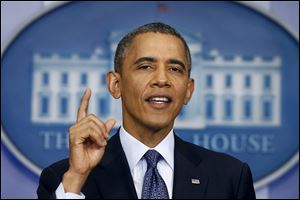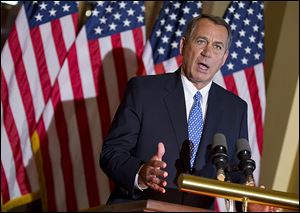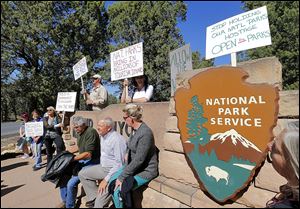
President, Boehner trade barbs on shutdown fiasco
Obama firm that he won’t negotiate concessions with GOP
10/8/2013
President Obama: American people do not get to demand a ransom for doing their jobs.'
ASSOCIATED PRESS

President Obama: American people do not get to demand a ransom for doing their jobs.'
WASHINGTON — President Obama on Tuesday intensified his pressure on Republicans with a hastily scheduled news conference, calling on them to fund and reopen the government and to raise the nation’s borrowing limit as the federal shutdown entered a second week.
“Let’s lift these threats from our families and our businesses, and let’s get down to work,” Mr. Obama said in the White House briefing room before taking questions from reporters.
Mr. Obama said he was holding firm that he cannot negotiate concessions to the Republican-led House for it to perform Congress’ constitutional responsibilities.
“I am happy to talk with him and other Republicans about anything,” Mr. Obama said of House Speaker John Boehner of Ohio, “not just issues I think are important, but also issues that they think are important. But I also told him that having such a conversation, talks, negotiations shouldn’t require hanging the threats of a government shutdown or economic chaos over the heads of the American people.
“Think about it this way,” he added. “The American people do not get to demand a ransom for doing their jobs.”
Mr. Obama phoned Mr. Boehner earlier to urge him to allow a House vote on a budget bill without conditions, as Mr. Boehner called on the President to come to the negotiating table to resolve a spending standoff that has shuttered the government for eight days.
“I had a phone call with the President of the United States this morning,” Mr. Boehner said at a news conference. “I will say it was a pleasant conversation, although I have to say I was disappointed that the President refuses to negotiate.”
He added: “When it comes to the debt limit, I agree with the President: We should pay our bills. I didn’t come here to shut down the government. I certainly didn’t come here to default on our debt.”
The competing pushes by the President and Mr. Boehner came after a closed-door meeting of House Republicans produced no new offers to resolve the spending stalemate and no plan for what to do about the fact that the federal government is set to hit its borrowing limit next week.

Boehner: ‘Refusing to negotiate is an untenable position.’
According to the White House, the President again told Mr. Boehner that he was willing to negotiate, but only after the “threat of government shutdown and default have been removed.” The White House said that areas the President would be willing to discuss included “how to strengthen the Affordable Care Act and continue to reduce the nation’s deficit.”
The speaker’s office said the call broke no new ground.
“The President called the speaker again today to reiterate that he won’t negotiate on a government funding bill or debt limit increase,” said Brendan Buck, a spokesman for Mr. Boehner.
Even as Mr. Boehner’s office put out word of the call, Mr. Buck declined to say how the speaker had responded to the President.
More than a week into the shutdown and nine days from a possible debt default, House Republicans emerged from their meeting with a united demand: They will make no move to resolve either crisis until Mr. Obama extends an olive branch.
Republicans on Tuesday put forth their latest effort to pressure Democrats to come to the table, calling for a bipartisan, bicameral committee to convene to address the impasse over the shutdown and the debt ceiling.
Democrats, however, immediately dismissed the idea as another ploy by Republicans to demand unreasonable concessions in exchange for reopening the government and raising the debt limit, ensuring that it will go nowhere in the Senate.
“The President’s position that we’re not going to sit down and talk to you until you surrender is just not sustainable,” Mr. Boehner said.
Rep. Kevin McCarthy of California, the No. 3 House Republican, said: “Mr. President, give a call. We’re ready to answer.”
If that is meant to raise the political pressure on Democrats, they showed little sign of backing down on their position that to compromise over the basic functions of financing the government and preventing a default would only encourage more crises and more hostage-taking.

Protesters against the government shutdown gather at the Grand Canyon National Park entrance, which remained closed to visitors because of the partial government shutdown.
Complicating matters is a Republican contention that the Oct. 17 deadline for a debt ceiling increase is fluid at best, and possibly mythical. Rep. John Fleming (R., La.) said lawmakers “have plenty of time” to work out a broad deal to reduce the deficit and overhaul entitlement programs before the statutory borrowing limit must be raised.
“We’re already living hand-to-mouth, and have for the last three years,” he said. “Why do we want to make the problem even worse?”
Some Republicans continue to say the Treasury is receiving ample tax revenues every day to pay off creditors and avoid a default. Additional government services might close and contracts might be suspended as the administration prioritizes debt servicing, they say, but an actual crisis is far off.
Most economists say a default would be cataclysmic. The government shutdown has already rattled world stock markets; the Dow Jones average fell by 159 points on Tuesday.
And, in the latest in a string of dire warnings, the International Monetary Fund said failure to raise America’s debt limit could lead to default and disrupt worldwide financial markets, raise interest rates, and push the U.S economy back into recession.
But after assuring lawmakers privately that such a crisis would never happen, Mr. Boehner is now drawing a harder line.
In the meeting Tuesday, he told lawmakers that it would be “irresponsible” to allow the government to borrow more before locking in changes to the health-care law and Medicare and Social Security that would bring down spending over the long term.
Rep. Reid Ribble (R., Wis.) sent a letter to Mr. Boehner with 51 House Republicans demanding that any long-term debt ceiling increase address the politically fraught issue of Social Security spending.
“Unless we have major reforms to the way our government spends, I’m not going to sign some blank check for irresponsible policy,” said Rep. Matt Salmon (R., Ariz.) expressing a sentiment that most House Republicans seem to share.
Information from the Associated Press was used in this report.